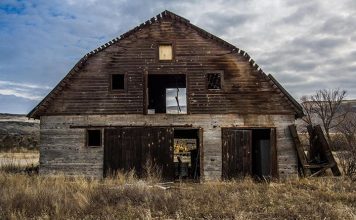 |
|
| Issue #137 • September/October, 2012 |
I’ve always been a student of science and history. They tell you things many people don’t know. I especially pay attention to statistics, which underlies all science, and I use history to put statistics into proper perspective. It not only allows you to make better informed decisions about the future, but it can make you look pretty smart if you’re a magazine publisher.
For example, in the March/April 2008 issue (Issue No. 110) of Backwoods Home Magazine, while then Senator Obama and Senator John McCain were campaigning for the Presidency, I wrote an editorial titled, Planning for the Inevitable. It contained the following:
“Has anyone noticed that the politicians seeking to be President don’t even talk about the looming recession? Economists do, but the candidates don’t. They pretend it’s not there. It’s almost surreal! The housing market has imploded, the dollar is diving, the debt is skyrocketing. Why don’t they talk about it? Of course, they wouldn’t know what to do about it anyway. And they’ll only make it worse with their ‘Government’ solutions.”

In the subsequent issue of BHM, our cover announced the arrival of the economic recession with a giant hand squeezing Planet Earth under the title, Gearing up for an Economic Squeeze. The first sentence of my Publisher’s Note read,
“This Special Preparedness Issue is driven by what we perceive as the need for Americans to prepare themselves for a prolonged economic slump.”
Six months later, outgoing President Bush called a special news conference to announce the American economy was on the edge of a precipice and that a $700 billion stimulus package was urgently needed to “save America’s financial system.”
Here we are four years later, after an additional $800 billion stimulus package by President Obama and two multi-billion dollar Federal Reserve stimulus plans called QE1 and QE2, and we’re still in that economic slump that nobody in government saw coming. And when they did take action with their various stimulus plans, they made things worse and prolonged the recession.
And now that we are in another presidential election cycle, this time with President Obama and Governor Romney talking about vague plans to boost a “slower than expected economic recovery,” it’s obvious neither one understands what happened economically or what is happening now.
Yet I can confidently predict that the current economic slump is going to get worse and will last at least another few years, and if the government and the Fed intervene with more of their “Government solutions,” it will last even longer and turn into a Depression.
How do I know this, and how come the politicians and bureaucrats at the highest level always seem to get caught by surprise by economic news?
The answer comes right back to understanding statistics and history. I wasn’t the only one who knew about the severity of the impending recession that began in 2008. Many economists knew because they, too, study statistics and history. They were trying to sound the alarm prior to 2008, but politicians and bureaucrats just don’t listen because they think they know how to run the world, guided by their political ideology rather by statistics and history.
And today, as the deepening economic downturn engulfs Europe and slows growth in Asia to a crawl, the statistics concerning bank failures, government debt, unemployment, the rise in the Underground Economy, etc. are trying to tell us in light of the fact that history has seen this before that things are about to get much worse, not just for Europe, but for America. It’s fairly easy for economists and people like me to seem pretty smart as we try and sound the alarm again.
But it’s like screaming into the wind as far as the politicians and much of the public are concerned. They seem to understand only in retrospect, years after the damage occurs, and then they try to rewrite history to suit their own version of what happened.
To put the current economic statistics in perspective, we students of history have only to go back to the 1920s in America and see that that era’s surprise recession was followed with multiple ill-advised government interventions to try to “fix” the economy, and it led instead to the prolonged Depression of the 1930s that was only stopped by the onset of World War II.
The Underground Economy
One of the most portentous statistics of the current recession is the rise of the Underground Economy, sometimes called the Shadow Economy by economists. It consists of people who have dropped out of the regular economy and conduct business out of sight of the Government, particularly the IRS.
It’s a fairly good predictor of how ordinary people protect themselves during a down economy, or during periods when they view government as interfering too much in the private sector.
One of the best statistical sources for this is Economics Professor Emeritus Edgar Feige of the University of Wisconsin-Madison who has spent much of his adult life making sense of the numbers. According to him, during the past 10 years the ratio of unreported income to reported income has risen dramatically, reaching levels not seen since the Great Depression and World War II when rationing contributed greatly to a black market in nearly everything consumable. Almost one-quarter of American income is now unreported to the IRS, up from about 9% when the economy is functioning well.
But that’s only the tip of the iceberg, according to Stuart Staniford, Chief Scientist at FireEye, a cyber security firm. He says the actual Underground Economy is closer to 75% of the real economy worldwide because it also includes things like domestic households, the barter economy, the volunteer economy, the “under the table” economy, and the criminal economy. He says the more dysfunctional economies, such as third world countries and collapsing economies like Greece, have a greater share of their economic activity go Underground.
Underground Economy statistics are driven by several factors, according to a study by the World Bank. They include:
- higher tax rates
- increased government regulation
- higher Social Security benefits
- unemployment
- decline of loyalty towards public institutions
Which leads us to Greece, the most ominous predictor of what the future holds for everyone, including America. The public institutions of that heavily-taxed, overregulated, social welfare state have fallen into disfavor in the eyes of its increasingly unemployed citizens ever since the government started cutting back on all the lavish pay, vacations, pensions, medical care, and other free stuff.
You’ve probably seen the Greek riots in the streets, many organized by their formerly all-powerful unions who are now enraged by the drastic cuts in freebies. Greek citizens enjoyed a bountiful living for years on borrowed money. But then the money ran out and the debt came due. Greece is not only out of money, but out of borrowing power, so the only thing left for its citizens to do is flail out at their own government for its inability to let the party roll on.
Greek politicians talk of restoring the benefit cuts by “catching tax cheats,” that is, going after people who have joined Greece’s Underground Economy in their own attempt to survive. I doubt that will work. People trying to survive are too clever for governments.
The best case scenario for Greece, at least as far as the rest of the world is concerned, is that the violence is confined to Greece and does not travel throughout Europe as other economies disintegrate. Political instability in Europe has historically led to a big war of some sort.
An American response
If Greece is a harbinger of the future, and if Professor Feige’s statistics about America’s Underground Economy are accurate, they may very well be accurate predictors of how ordinary Americans will take back their country from a runaway state.
Ordinary Americans, especially young people, are fleeing our own Government’s attempt to take over greater segments of the economy. Young people, especially, have caught on to Ponzi schemes like Social Security and Medicare, and they understand that multiple multi-billion-dollar bailouts are a statistical nightmare for their dollars of the future. They also see the job numbers in the regular economy and realize the Government is lying about them, that the real unemployment statistics reveal not an 8.2% unemployment rate but a near 15% rate if you include people who have stopped looking for work.
I’ve predicted in the past that America’s revolution would come from the young as they seek to take back the futures that have been stolen from them. This may be how they conduct their revolution by ceasing to participate in the above-ground economy and descending instead into the Underground Economy.
Instead of waiting in vain for government to reform the system from within, they’re going to try to starve the beast, as it were, until it either collapses and they can rebuild their futures or it starts generating policies that make sense for their futures.
I like it. It’s very American!














